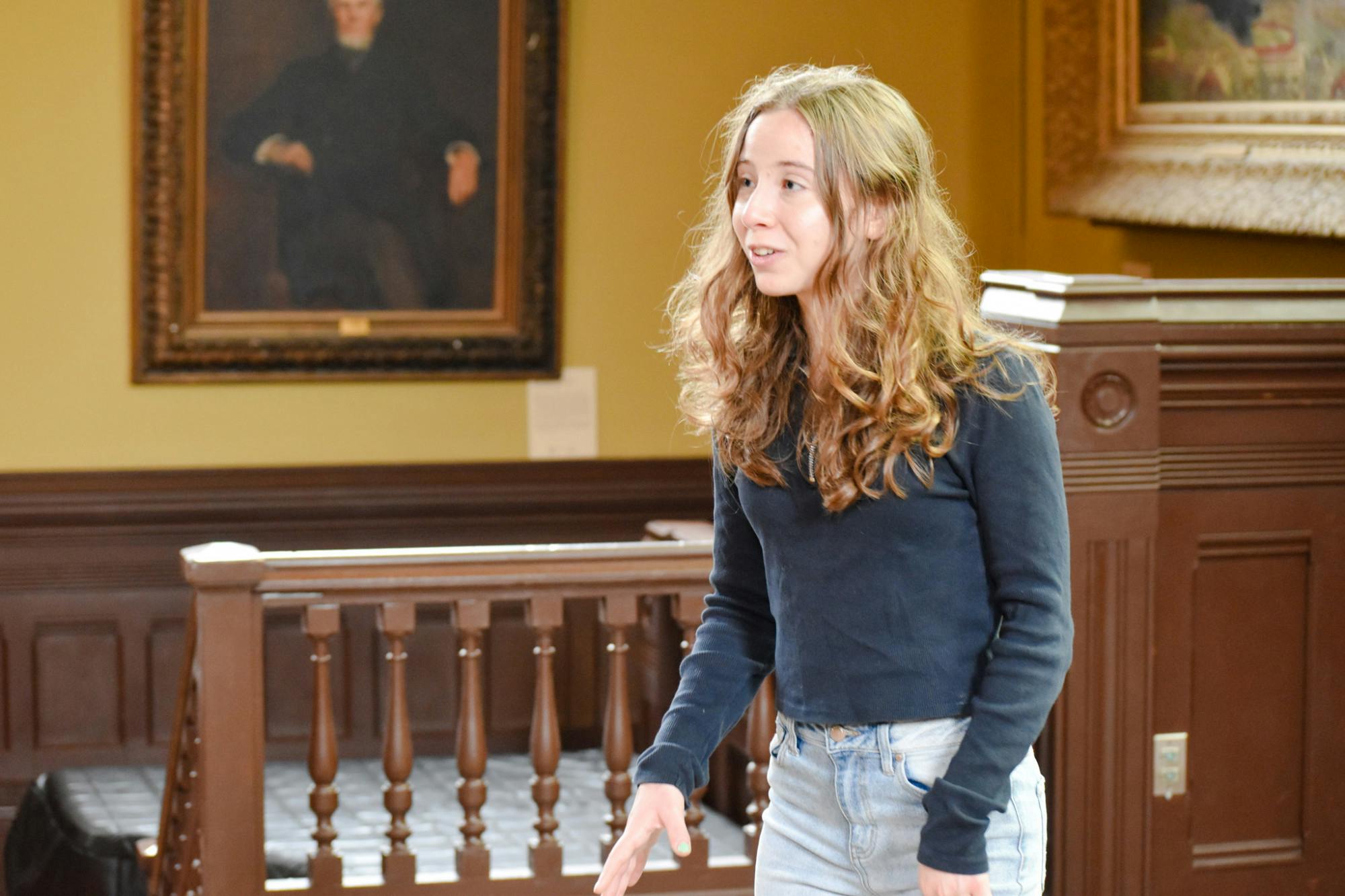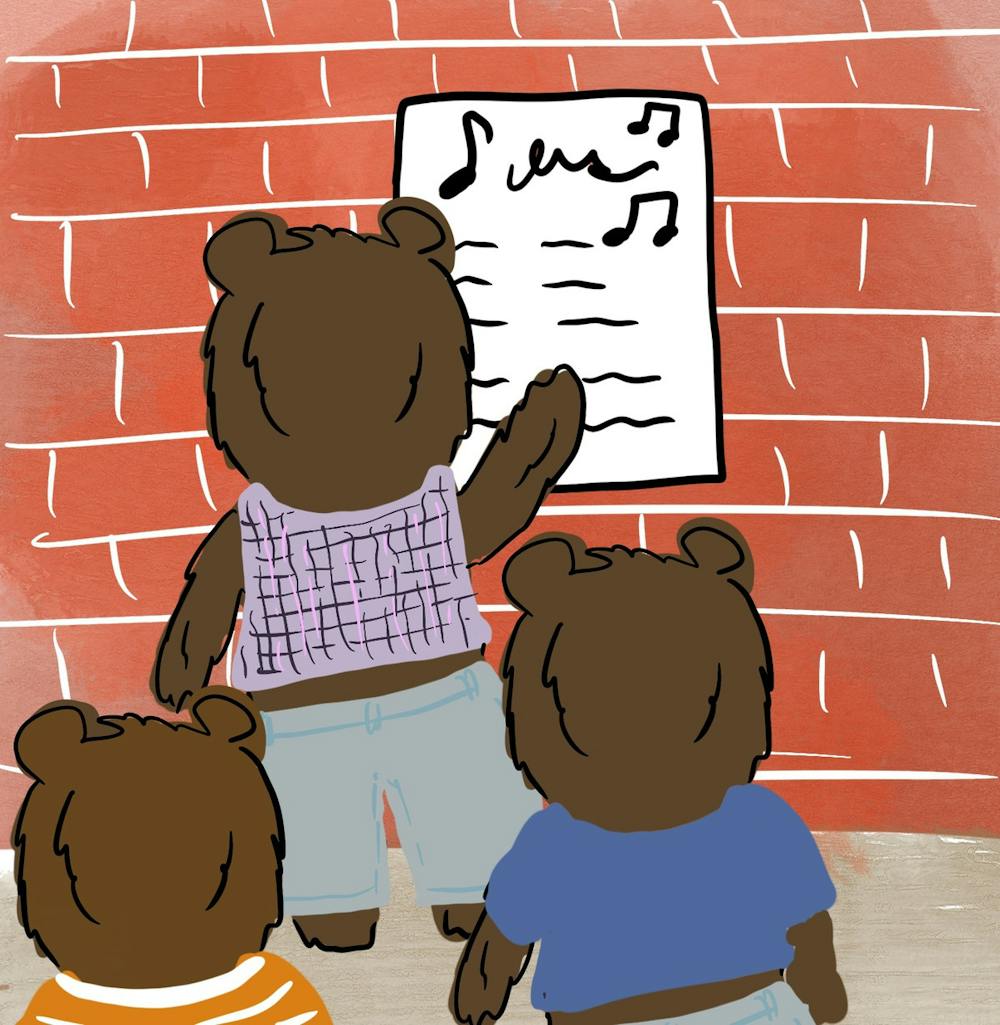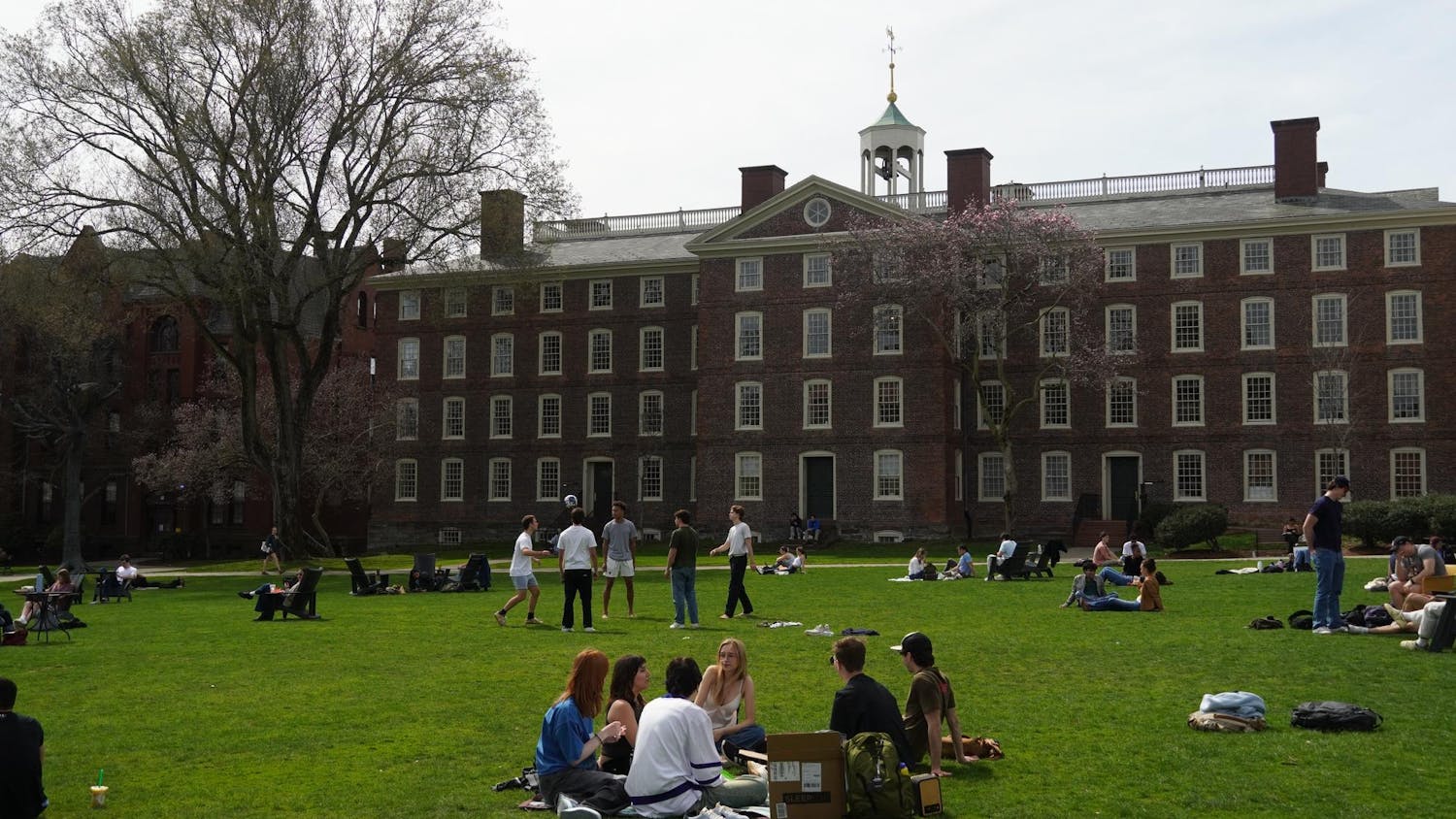With the pressure of starting classes, shifting friend groups and settling into an unfamiliar campus, first-years already have a lot to navigate this fall. Some have never been away from home, and others are buying their first pair of winter boots. All are beginning to find that college life is more than a cycle of lectures, papers and exams. Rather, college is heavily shaped by gathering with different people around common interests — a process largely facilitated by student organizations.
Many first-years spend the opening months of the fall semester looking for new communities to join. While Brown’s campus offers numerous options — the University is home to over 500 organizations — each year, a large number gravitate toward a cappella.
With 15 groups, Brown is home to the most a cappella groups per capita in the United States, according to the Intergalactic Community of A Capella website. Ten of these 15 comprise IGCAC, an overseeing body that helps organize a cappella affairs on campus. All IGCAC groups hold auditions over the same three-day period, though students can ultimately only join one of them, according to Chattertocks member Alyssa DeVilla ’23.
The Herald followed four first-year students through the a cappella audition process, speaking to them before, during and after.
‘Go do some a cappella’
This year, fall IGCAC auditions were held from Sept. 19 to 21 on the upper floors of Page-Robinson Hall. On almost every level of the building, crowds accumulated as auditionees waited patiently for their turn to sing for each of IGCAC’s groups. Inside the audition rooms, veteran a cappella members cheered as the new singers performed scales and variations on various popular songs.
To increase their chances of getting a callback, many students chose to try out for multiple groups. Auditionee Anna Samel ’26 tried out for the Ursa Minors, the Chattertocks and the Jabberwocks. Her choices, she said, were more or less arbitrary. “I don’t know much about any of them,” she said. “I’m kind of just randomly going for it and hoping for the best.”
Some auditionees chose to focus on only one or two groups to not overextend themselves. “I didn’t think about applying to a whole bunch (of a cappella groups), mostly because freshman year is busy,” auditionee Nina Lidar ’26 said. “I sort of thought I’ll just try out for one. If it works out, cool. If not, I’ll just try it out again later.”
Most auditionees The Herald spoke to had some form of previous singing experience, and many had done their fair share of a cappella in high school.
“I’ve been singing my whole life,” said auditionee Jordan Heinrich ’26. “I’ve had formal lessons since I was five, which stopped during COVID, and then I did a lot of musical theater in high school.” She was also a member of an a cappella group in ninth grade.
Auditionee Fergus Bolton ’26 had been in charge of all of the a cappella groups at his high school. Yet upon arriving at Brown, he was still unsure whether singing was something he wanted to pursue. In the end, his mother helped make the decision for him.
“My mom said, ‘Fergus, you’re good at singing, go do some a cappella,’” Bolton explained. “So I said, ‘Okay.’”
Some auditionees had already been exposed to the University’s a cappella scene before coming to campus. The Brown Derbies visited Samel’s middle school in England, she explained.
For her solo on audition night, Samel chose to sing “Royals” by Lorde. “It’s actually the song I auditioned with during my freshman year of high school,” she said. “It worked well for me then, so I’m hoping it has some magic left.”
Bolton and Lidar both chose Frank Sinatra’s “Fly Me to the Moon,” albeit for different reasons.
“Most of my repertoire is pretty classical, operatic stuff, and it sort of bridges that gap between modern music and classical music quite well,” Bolton explained. “And it’s in my range, which is quite important.”
Lidar, on the other hand, chose the song because she found it “short and sweet.”
“I know the lyrics, and that was kind of all I was looking for in a song choice,” she said. “I’m comfortable singing it.”
Practicing proved to be a bit difficult for some auditionees. Heinrich takes music classes on campus, so she was able to use the space to rehearse after her lessons.
But Samel pointed out that a college dorm is a less-than-ideal spot for singing at the top of one’s lungs. “I have not been practicing too much because one, didn’t want to do that in front of my roommate, and two, didn’t want my neighbors to hear,” she said.
Lidar also felt that she should have practiced more than she did. “I started about an hour ago,” she said.
Still, most auditionees left Page-Robinson feeling both confident and relieved.
“I feel good,” Heinrich said. “I feel so much less nervous than I was before, because afterward there’s nothing I can do about it. I think it was the right song. I think I was just nervous, and I’m hoping to work on that.”
Many auditionees were impressed with the levels of support the IGCAC groups offered. All the groups, they said, seemed to want their auditionees to feel as comfortable as possible.
“They seemed like a fun group,” Lidar said, in reference to her audition for the Jabberwocks. “They were super welcoming and encouraging.”

“I’ve been singing my whole life,” said auditionee Jordan Heinrich ’26. “I’ve had formal lessons since I was five, which stopped during COVID, and then I did a lot of musical theater in high school.” She was also a member of an a cappella group in ninth grade.
‘I’m just going to try to have fun’
These brief, under-ten-minute performances are only the first step of the IGCAC audition process. After three nights of solo auditions, followed immediately by deliberations, each group assembles a list of students they’d like to see for callbacks, DeVilla explained. Auditionees told The Herald they received the results of the callbacks via email.
Samel received her first email that Wednesday night around 11:50 p.m. She would discover the results of her other auditions the next morning, receiving two callbacks — one from the Chattertocks and the other from the Ursa Minors.
“I was excited,” she said. “I actually tried to do the worm.”
Bolton, who received callbacks for the Bear Necessities, Brown Derbies, Jabberwocks and Alef Beats, was similarly elated and could not wait to share the news. The first thing he did was text his mother.
Lidar received a callback from the Jabberwocks.
The IGCAC callback process is more exhaustive than the initial audition, several auditionees told The Herald. First-years said it typically lasts four hours and involves exercises in vocal blending, learning some of the group’s repertoire and solo performances. Auditionees are often invited to chat and have coffee with group members beforehand.
Those involved still tried to approach this second stage of selection with optimism and realistic expectations.
“Even though I definitely will be nervous, I want to try to approach it with an open mind and just try to be happy that I’m there, rather than worrying about whether I’m going to get in,” Bolton said before his callback.
Heinrich expressed a similar sentiment, especially after being so nervous at her first round of auditions. “With callbacks, I’m just going to try to have fun and kind of forget about it a little,” she said beforehand.
In addition to getting to sing, many auditionees were excited by the prospect of becoming members of a student group on campus.
“At any time in my life, but especially because I’m a freshman right now, I think having an environment so positive and being able to do something I really like doing would be great,” Samel said.
“It would be a really nice way to establish myself within a community on campus,” Lidar said. “Freshman year is turbulent, and so it would be lovely to have as a designated community.”
“If I don’t get this, I do still have a group to be a part of,” she added, referring to her involvement in Brown’s choir. But a cappella groups tend to have a more contemporary repertoire, she added that she really wanted to get back into singing that kind of music.
Heinrich used callbacks as a time to put a cappella in perspective.
“Now I’m kind of taking a step back, being like, ‘Well, if I try again, and if I have more choices, is there something I would want more?’” Heinrich said. While incredibly happy with the two callbacks she received, she was starting to realize that this search for community she had embarked on could also involve other student groups outside of a cappella.
“I’m definitely looking forward to getting into the performing arts scene, whatever that may be,” Heinrich said. She plans to attend a theater audition soon and continue seeking out other musical opportunities.
‘I ended up in the place I wanted to end up in’
After callbacks, all of the auditionees were given a few days to decide their rankings of the a cappella groups under their consideration. Samel was very thankful for this time, explaining that she felt welcome at both callbacks.
“Both groups did a good job of alternating between singing and talking about the group and letting the people that were called back get a feel for what the group was like,” she said.
Decisions were finalized between 9 a.m. and 9 p.m. on Friday, when each student slid a card containing their ranked preferences into a pink box sitting in the Sciences Library basement, Heinrich said.
That night, all of the IGCAC groups convened to match the auditionee’s top choices with their own. They then notified everyone who attended callbacks of the final outcome of their audition, she continued.
Heinrich, Bolton and Samel, like the rest of the auditionees, were told to be in their dorms by 11:30 p.m. Shortly after midnight, each was surprised with a group of singing college students standing right outside their dorms.
“I opened my door to go do something and they were all standing there,” Heinrich said. She was invited to become one of the newest members of the Alef Beats, who were now singing a welcome in her name.
The Alef Beats were the only group Heinrich had written down on her card. “It wasn’t an end-all-be-all (that) I had to be in an a cappella group this semester, so I kind of just chose the one that I knew I wanted to be in,” she said. She explained that she had “put all of (her) eggs in one basket” but was happy things worked out well in the end.
“I liked the Jewish aspect a lot, so I felt a little bit more connected with the Alef Beats just because of that,” Heinrich added. “I ended up in the place I wanted to end up in.”
Bolton and Samel received similar welcomes that same night — Bolton from the Bear Necessities and Samel from the Chattertocks. Both were incredibly excited by the outcomes, having based their decisions largely off of the sense of community these groups exuded.
“The Bears were just the group I felt the most comfortable in,” Bolton said.
Samel expressed a similar sentiment. “The Chattertocks really seem like they’re kind of a family, and I’m excited to be a part of it.”
Despite the elation, IGCAC auditions felt exhausting for many auditionees. The entire process took about two weeks from start to finish and involved 10 IGCAC groups and hundreds of auditionees. The process repeats at the start of the spring semester. But without an influx of bright-eyed first-years the second-round auditions tend to be smaller.
“It’s quite a big time commitment when it’s all happening,” Bolton said. Now that it is over, he cannot wait to dive back into singing. But more than that, he is looking forward to “having a whole new group of friends.”
Corrections: A previous version of this article stated that Nina Lidar ’26 was not called back for a second round of auditions. In fact, Lidar did receive a callback, after which she did not receive a place in the Jabberwocks. Additionally, a previous version of this article miscaptialized the last name of Alyssa DeVilla ’23. The Herald regrets the errors.

Rya is an Arts & Culture editor from Albany, NY. She is a senior studying English and Literary Arts, and her favorite TV show is Breaking Bad.





